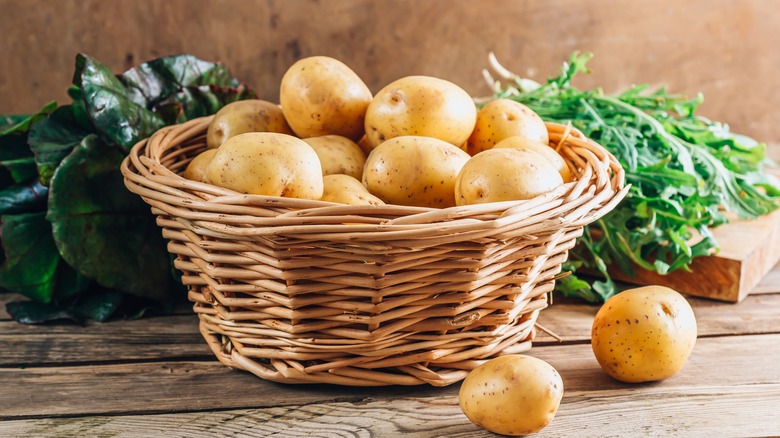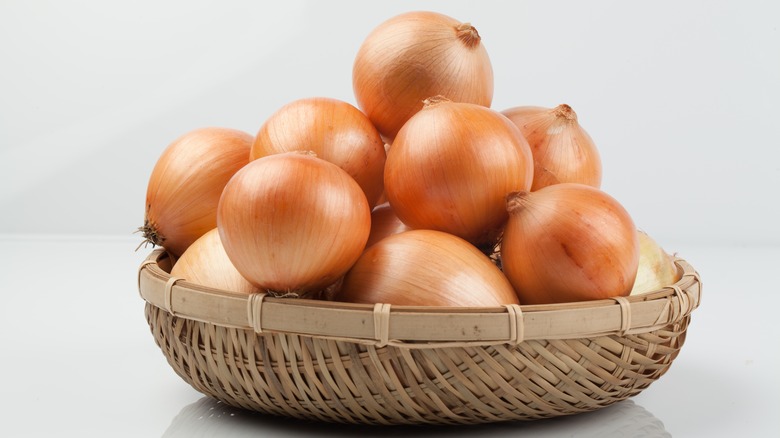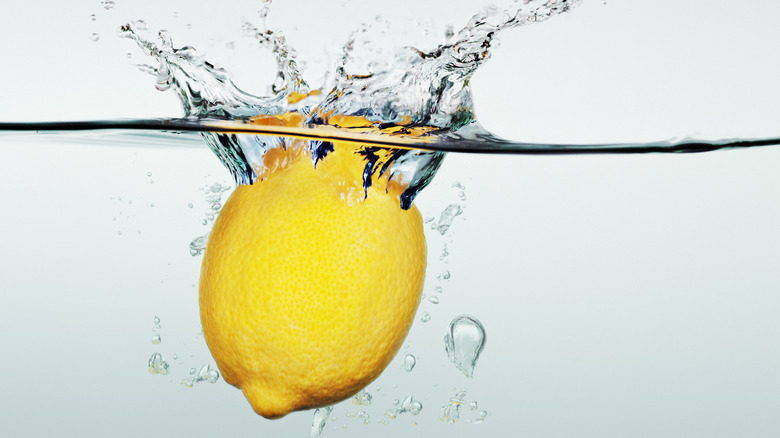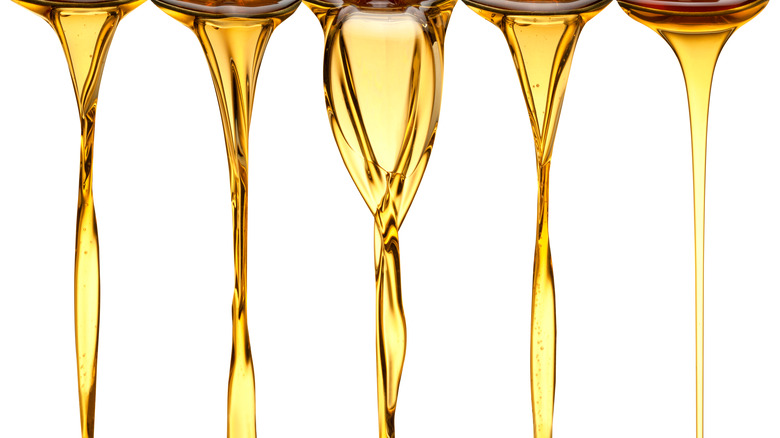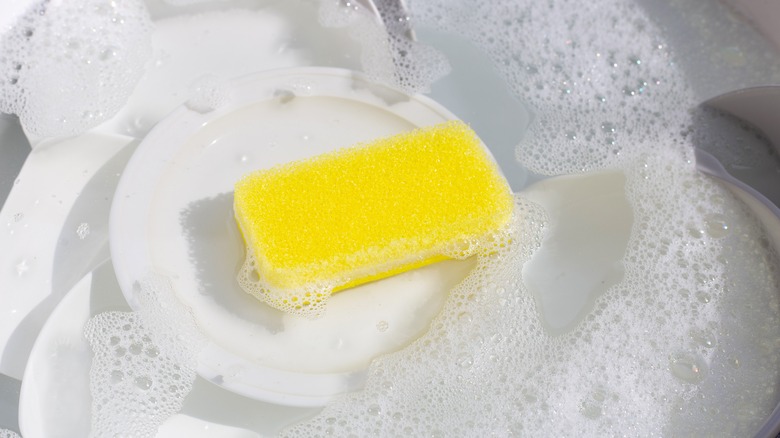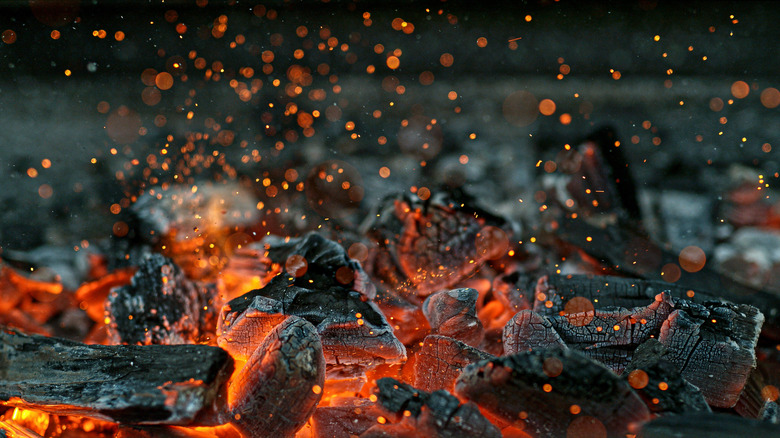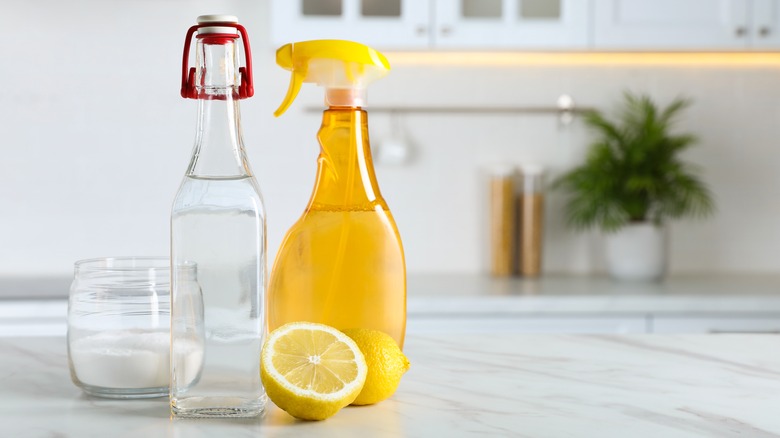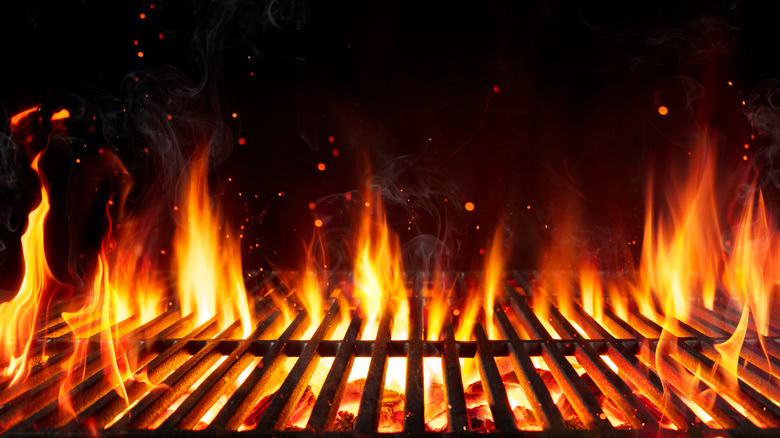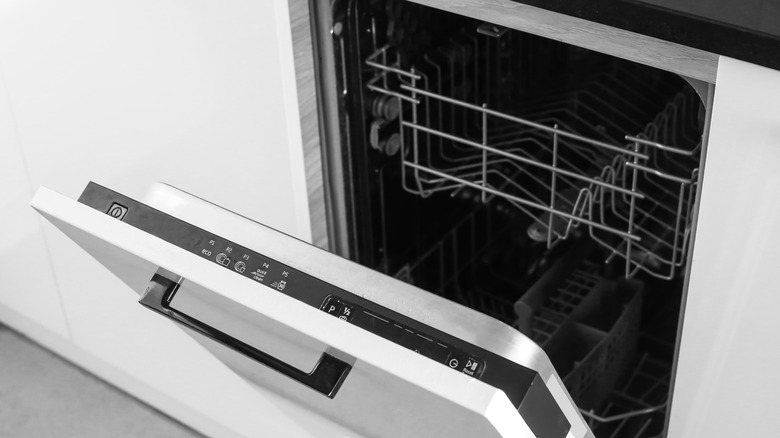9 Essential Tips And Tricks For Cleaning Your Grill
'Tis the season, and by that, we mean grilling season here in the U.S. — though some would say every season is grilling season. Whether it's a backyard barbecue to celebrate the Fourth of July, an excuse to crack open a cold one while you cook, or the opportunity to showcase your grilling skills for family and friends, nothing says "summer" like cooking outdoors. And there is something special about the taste of food cooked over an open fire, whether it's a juicy, perfectly-grilled steak, succulent chicken, or smoky eggplant.
When it comes to barbecuing, cleaning is just as crucial as the grilling itself. After all, no one wants to eat food covered in burnt chards leftover from the last grilling session. While it can be intimidating, especially for those just starting their barbecuing journeys, you don't need special cleaners to create a safe, clean grilling surface. Often, just a few household products or products and a bit of elbow grease will do the trick. Here are some easy tips and tricks to clean your grill this summer or any season.
1. Use a potato for regular maintenance
When it comes to usefulness, potatoes should be in a category by themselves. Not just for baking or frying, you can turn potatoes into a battery. They can also be used like seeds to grow other potatoes. And they can even clean and create a non-stick grill surface, a natural and easy solution for all your summer barbecuing needs.
To achieve optimal results, give your grates a good clean at the start of the season and again between each use, brushing away any old crumbs or food remains. Potatoes are more of a maintenance tool for in-between grilling sessions rather than for deep cleaning purposes. Once cleaned and ready to go, you'll want to add some heat to help the potato's natural starch activate and stick to the grates or grills. Then, slice a raw potato in half to create a flat surface area, and, using either barbecue tons or a long grilling fork to hold the potato, rub the flat, cut side of the potato against the grills or grates to coat. Cover the entire surface before adding your meat, fish, or vegetables. You'll want to repeat this process each time for optimal non-stick grilling results.
2. Try an onion on your grates
If you're looking for an inexpensive and chemical-free way to clean and disinfect your grill after making your favorite Mediterranean grilled chicken recipe, look no further than the humble onion for all of your grill cleaning needs. Thanks to onion's acidity and moisture, this root vegetable provides a great chemical-free way to help release and remove any charred bits of food stuck to the cooking surface after any good barbecue session. And, due to their natural antibacterial properties, onions are also a great alternative to a spray cleaner!
The process is easy. First, heat the grill to burn off as many lingering food bits as possible. Slice your onion in half, then place it cut-side down onto the grill, using tongs or a long fork to help keep your fingers safe and away from the heat. Then it's time to rub away, pushing the onion around to help remove any lingering bits until you're left with clean, ready-to-use grates. If you're working with a charcoal grill, you can throw the onion in with the charcoals to infuse a bit of its naturally sweet flavors into any meat, fish, or vegetables.
3. Clean your grill with a lemon
There's something about the smell of fresh lemon that we associate with feelings of cleanliness, that bright citrus smell, even the vibrancy of its yellow hue. It's probably why so many cleaning products use a lemon scent to further cement these associations with the product. The wonderful thing is the associations with a lemony scent and a clean house or product are justified. Lemons are a fantastic natural cleaning product; you can use them to clean your grill, too!
Thanks to lemons' acidity, lemon juice is a natural antiseptic and antibacterial and can be mixed with salt to create a powerful degreasing tool. All you have to do is slice a lemon in half width-wise, dip the freshly-cut fleshly circle in salt crystals, and place the cut side down directly onto a hot grill. As with the onion, we recommend holding the lemon with a long grilling fork or tongs to save yourself from the risk of burns. Next, squeeze the lemon a little to release its juice as you use the fruit as a natural scour to remove bits of food and grease. Then, follow with a potato to create a non-stick surface, and you're ready to grill away to your heart's content.
4. Rub a cold grill with oil between uses
Want to keep your grill non-stick and ready for a spontaneous grilling session at any moment? All you need is olive oil and some elbow grease. What could be easier?
This handy trick only works if you start with a clean and prepared surface. This means giving your grill a bit of love, time, and more elbow grease at the beginning of barbecue season (whenever that is for you). Giving the grates a good scrubbing to remove any remaining burnt on leftover meats or sauces will set your future self up for barbecuing success by removing friction, making it harder for foods to stick to the surface. This will also increase your chances of a beautiful, well-cooked meal, making it less likely to ruin food due to pesky sticking.
When using oil between grilling sessions, you'll want to avoid oils with lower smoking points like extra virgin olive oil, as well as flavored oils such as sesame. Instead, choose oils with the highest smoke points, like refined avocado oil, if possible. It has a smoke point of 520 degrees Fahrenheit, perfect for handling the high, direct heat of a barbecue.
5. Soak grates in dish soap and baking soda at the start and end of the season
The classic, age-old excuse when trying to get out of the washing up after a meal is to simply fill the hard-to-clean pot or pan with water and dish soap and leave it in the sink to "soak." Though it can be a useful cop-out for those who hate washing dishes, it also happens to be a trick that works, especially when using the right soaking solution.
While soapy water is okay, baking soda mixed with dish soap is even more effective. It even works on dirty sheet pans, practically begging those on dish duty to soak while they watch an episode of their favorite show rather than scrub. To improve the results of this excellent excuse, you'll want to fill up your sink with water, then add around half of a cup of baking soda. Next, you'll want to make a paste of dish soap and more baking soda, rubbing the paste all over the grill grates before soaking in the baking soda-infused water for at least one episode of your favorite sitcom. This is the perfect, low-effort way to kick off the start of summer grilling season, then follow it up with one of our other non-stick or maintenance hacks for best results.
6. Make sure to empty out charcoal ash
Gas is great, but there's nothing quite like the smoky, distinctive taste of cooking over a charcoal grill. Though it can be an exercise in patience, waiting for the coals to catch and generate their internal heat, good things do come to those who wait. Grilling with charcoal requires more time, which works to the food's advantage in helping to develop bigger, deeper flavors, which can ultimately mean a tastier and more satisfying meal. Charcoal can be a great way to elevate and accentuate certain foods like steak, chicken, or joints like pork shoulder or leg of lamb. Charcoal also plays well with more substantial vegetables like eggplant or corn.
However, in order to create a mouthwatering meal from a charcoal grill, it is imperative you clean out the old ash and embers each time you grill. First, wait until they are completely cool; 48 hours is recommended if possible. Then, clean the ashtray or pan under the grill and any ash from around the base of the grill or grates to make sure you're starting your next barbecue clean and fresh. However, while you could throw the ash away, it also makes fantastic plant food, so consider saving it and sprinkling it into your backyard garden for the ultimate regenerative agriculture-meets-grilling practice.
7. Deep clean with vinegar and baking soda
Baking soda is one of the most adaptive tools in your kitchen. From helping cookies to rise to keeping your fridge smelling good to deep cleaning just about anything — including your teeth — there's not much that doesn't benefit from a bit of baking soda.
When it comes time to deep clean your grilling grates, reach for your trusty, unused baking soda alongside a splash of white distilled vinegar (save the balsamic for your next salad). This combination creates a powerful, chemical-free trick to getting the job done quickly. First, mix two cups of vinegar with one cup of baking soda (or two parts to one, if using more or less). Then, pour the solution into the sink, a bucket, or a garbage bag and soak your grate overnight for easy, hands-off cleaning. The combination of ingredients will work to break up and dissolve any stuck-on particles of food, leaving your grates smooth, clean, and ready to be oiled or potato-ed to create non-stick surface.
8. Turn up the heat
Overall, the appeal of barbecue for cooking is its use of direct, high heat to create an irresistibly smoky flavor. Why not use the barbecue's best asset, heat, to clean too? This might be the easiest first step when deciding to give the grates a good deep clean at the start or end of the season.
While there are other suggestions, such as wire brushes or tin foil, hot and fast heat does not tend to come with the controversy that the others possess. For gas-powered grills, after you finish your barbecue, keep the heat going for around 15 minutes to burn off any remaining residue. For charcoal-powered grills, this same step occurs at the beginning of a barbecue session while the coals begin to heat up. Scrape away any remaining ashes or bits and you're good to go. You can also help move this process along by using an onion, as we discussed earlier, to help encourage the extra hard-to-remove bits that just don't want to let go.
9. Avoid the dishwasher
While the dishwasher is arguably one of the greatest modern inventions, it isn't a catch-all for everything, including the kitchen sink. There are kitchen and barbecue equipment pieces that don't mix well with this otherwise incredible piece of machinery. Such items include wooden utensils, cutting boards, or rolling pins, which will only swell with liquid and then deteriorate and discolor as the hot water and soap work against this natural product, stripping it of its natural oils and slick finish.
Other such no-nos include sharp knives, travel mugs, pots and pans, and grills and grates from the barbecue. Should any of these items be made from cast iron or steel, you can guarantee rust if using the dishwasher, which is never good for anything that comes into contact with food. Secondly, you risk breaking the dishwasher itself due to too many pieces from the grills getting trapped, shortening the appliance's life. No one wants to have to hand wash the dishes or eat rust, so it's the safest practice to keep the lives of your dishwasher and your grill separate for the best results.

